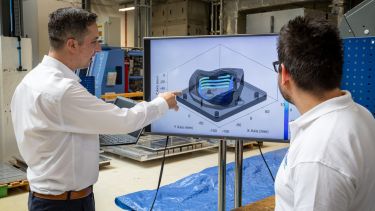PhD Study
The University of Sheffield offers various PhD programmes with different opportunities to study Artificial Intelligence.

PhD opportunities
Language Model-Grounded User Simulation for Personalised Conversational Systems
Department of Computer Science
This PhD project aims to advance the development of personalised conversational systems by leveraging user simulation, an area of research supported by recent advancements in large language models known for their strong capability in natural language understanding and generation.
Deadline: Saturday 1 June
Embodied Decisions in Animal and Robot Brains
Department of Automatic Control and Systems Engineering
This project will study mechanisms for making effective decisions to achieve goals that are embedded in space, drawing on inspiration from brains to design algorithms for robots.
Deadline: Sunday 2 June
Collective Decisions in Animals and Robots
Department of Computer Science
This project will study mechanisms for making effective collective group decisions to achieve goals that are embedded in space, drawing on inspiration from animal behaviour and neuroscience to design algorithms for robots.
Deadline: Sunday 2 June
AI for Multi-modal Healthcare
Department of Computer Science
A 3.5-year funded PhD studentship is available in the Department of Computer Science at University of Sheffield, working on the topic of multi-modal AI for healthcare. This project will focus on developing multi-modal AI models that can handle the complexities of medical data as well as the domain gap and knowledge gap across different scenarios, and further adapt to individual patient needs.
Deadline: Monday 10 June
Find out more information and apply here.
Efficient and Robust Alignment of Large Language Models
Department of Computer Science
In this PhD, the student will explore developing new state-of-the-art methods for efficient and robust alignment of LLMs. Directions include: (i) data efficient fine-tuning and preference optimization; (ii) robustness to distribution shifts; and (iii) model compression.
Deadline: Monday 10 June
Find out more information and apply here.
AI-driven Geographic Data Integration
Department of Computer Science
We are seeking a motivated PhD candidate to contribute to our efforts to develop innovative artificial intelligence-based tools for integrating and consolidating multidimensional geographic data from diverse sources.
Deadline: Sunday 30 June
Find out more information and apply here.
Causal Representation Learning in Computer Vision
Department of Computer Science
The primary objective of this research is to develop novel techniques for learning causal representations from visual data.
Deadline: Sunday 30 June
Find out more information and apply here.
Energy-efficient AI Using Modular Deep Reservoir Computing
Department of Computer Science
This project aims to explore how diverse properties in recurrent neural networks can be used to create reservoir computing architectures able to tackle challenging real-world tasks.
Applications accepted all year round.
Find out more information and apply here.
Statistics and AI for Engineering and Smart Manufacturing
School of Mathematics and Statistics
We are thrilled to announce an exceptional PhD opportunity in the dynamic fields of Statistics and Artificial Intelligence, specifically tailored for Engineering and Smart Manufacturing. This project is designed for candidates eager to explore and expand the realms of statistical analysis and reliable AI in industrial pipelines, with a special emphasis on smart manufacturing and electronic design automation (EDA).
Applications accepted all year round.
Find out more information and apply here.
Artificial intelligence and machine learning methods for model discovery in the social sciences
Department of Automatic Control and Systems Engineering
Many theories have been proposed for how problematic social phenomena - such as segregation, inequality, and clustering of unhealthy behaviours - emerge and change over time. But which theories are useful for understanding these phenomena and devising effective interventions to change them? This project will develop computationally efficient model discovery methods to enable a search for explanatory multi-level agent-based models that can be calibrated to - and validated against - such empirical phenomena.
Applications accepted all year round.
Find out more information and apply here.
Online discussion; augmenting argumentation with chatbots
Department of Psychology
Argumentation - the systematic exchange of reasoning supporting or undermining an idea - enhances communication between individuals. Unreliable chains of thought are weeded out, reliable ones survive. Striking evidence for this is that reasonings tasks which provoke systematic errors when considered by individuals choice can be solved correctly by small groups, if they are given time for discussion. Chatbots with natural language processing create an opportunity to have artificial agents interact with group deliberation, and make it more effective. In this way, the strengths of human and artificial intelligence can augment each other
Applications accepted all year round.
Find out more information and apply here.
Machine Learning Digital Twins of Spintronic Neuromorphic Devices
Department of Computer Science
This project will develop the use of machine learning methods, particularly neural differential equations, for predicting the dynamics of experimental systems designed for neuromorphic computing.
Applications accepted all year round.
Find out more information and apply here.
